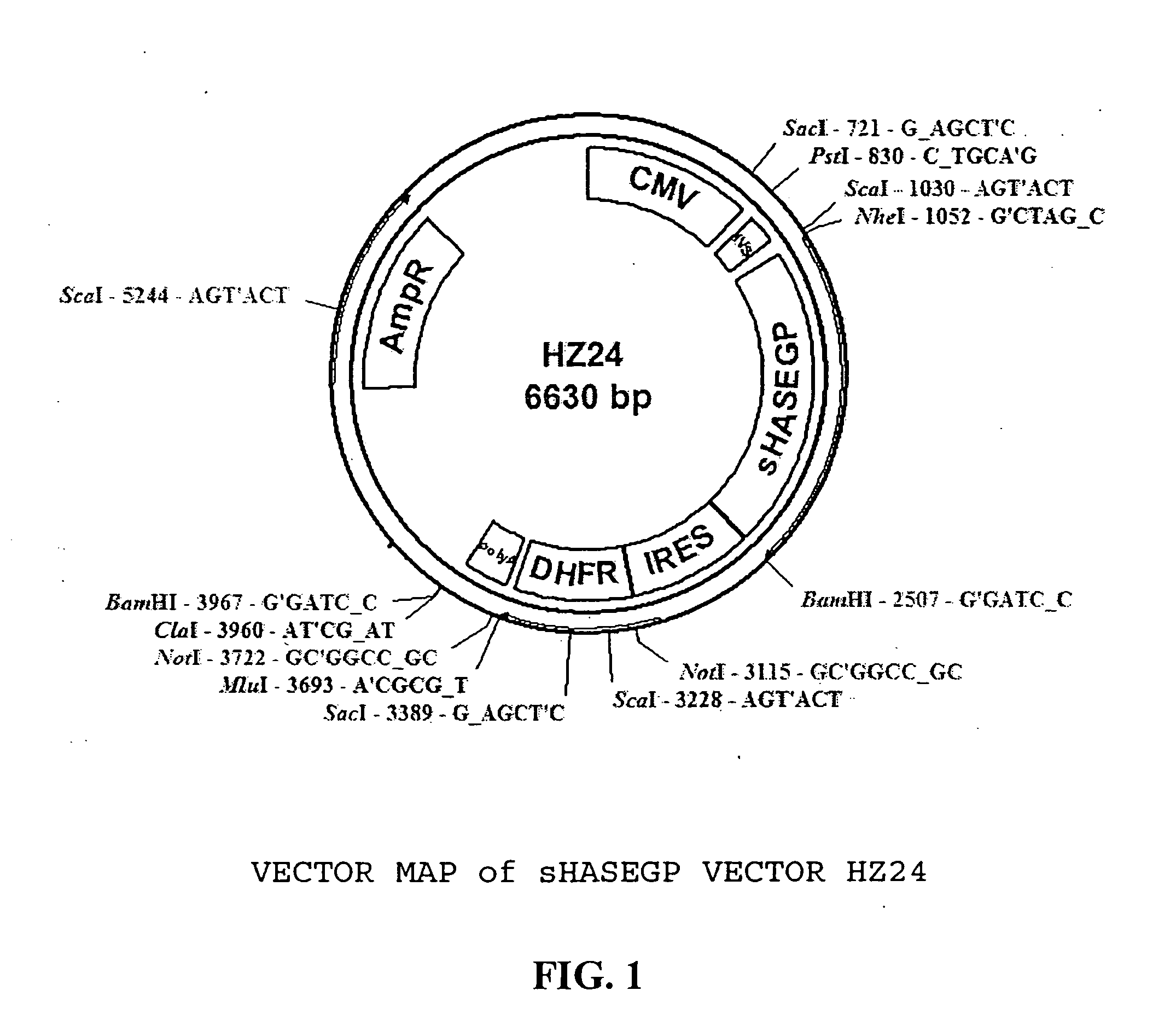Soluble glycosaminoglycanases and methods of preparing and using soluble glycosaminogly ycanases
a glycosaminoglycanase and soluble glycosaminoglycan technology, applied in the field of glycosaminoglycanase enzymes, can solve the problems of inability to produce catalytically active human shasegp, previous attempts to generate soluble neutral-active human hyaluronidase glycoproteins were unsuccessful, etc., to achieve effective and/or safe, enhance diffusion and/or convective transport, and improve the effect of rate ratio ratio
- Summary
- Abstract
- Description
- Claims
- Application Information
AI Technical Summary
Benefits of technology
Problems solved by technology
Method used
Image
Examples
example 1
Microtiter Based Hyaluronidase Assays
[0667] The following example provides for a rapid assay for measurement of the hyaluronidase activity of sHASEGP. This assay can be related to the TRU, the IU or NFU through use of a W.H.O. standard preparation of hyaluronidase.
[0668] Biotinylated Hyaluromam Microtiter Assay
[0669] The free carboxyl groups on glucuronic acid residues of Hyaluronan are biotinylated in a one step reaction using biotin-hydrazide (Pierce), Sulfo NHS (Pierce) and 1-Ethyl dimethylaminopropyl-carbodiimide (Sigma). This biotinylated HA substrate is covalently coupled to a 96 well microtiter plate in a second reaction. At the completion of the enzyme reaction, residual substrate is detected with an avidin-peroxidase reaction that can be read in a standard ELISA plate reader. As the substrate is covalently bound to the microtiter plate, artifacts such as pH-dependent displacement of the biotinylated substrate does not occur. The sensitivity permits rapid measurement of H...
example 2
Cloning of sHASEGP cDNA
[0680] Nucleic acid encoding Human sHASEGP may be obtained by one skilled in the art through a number of procedures including, but not limited to, artificial gene synthesis, RT-PCR, and cDNA library hybridization (for example see, Gmachl et al FEBS 336(3) 1993, Kimmel et al., Proc. Natl. Acad. Sci. USA 90 1993 10071-10075). Alternatively, clones encoding human sHASEGP may be obtained from IMAGE, or other suppliers of human gene sequences (Invitrogen Clone ID IOH10647).
[0681] The full length human PH20 cDNA was calculated to be 2009 nucleotides in length and contained an open reading frame of 1530 nucleotides. The 5′ UTR is unusually large, which can indicate a retained intron and can inhibit translation by preventing the ribosome from binding to the correct initiating methionine codon due to 9 non coding start codons in the 5′UTR. The protein (Genbank Accession number NP—003108) is predicted to comprise 509 amino acids SEQ ID No. 1 with a calculated molecula...
example-4
Isolation of SHASEGP From Human PH20 cDNA
[0684] A catalytically active secreted recombinant human sHASEGP expression vector capable of effective glycosylation in mammalian cells was generated as described below. Other expression constructs with promoters and selection genes for different species such as yeast and insect cells that are also capable of generating sHASEGP are contemplated. Positive selection genes such as Glutamine Synthase or Dihydrofolate Reductase (DHFR) may also be used. The examples given below is not intended to restrict but is rather provided as an example of several plasmid expression systems that may be used.
[0685] In order to construct secreted forms of sHASEGP, truncation mutants that lack the hydrophobic C terminal end were constructed. Using a GPI cleavage prediction program the GPI anchor cleavage site was located around amino acid position N 483 in the full-length GPI-anchored protein. A set of seven nested 3′ primers were used to construct a set of se...
PUM
| Property | Measurement | Unit |
|---|---|---|
| diameter | aaaaa | aaaaa |
| diameter | aaaaa | aaaaa |
| ionic strength | aaaaa | aaaaa |
Abstract
Description
Claims
Application Information
 Login to View More
Login to View More - R&D
- Intellectual Property
- Life Sciences
- Materials
- Tech Scout
- Unparalleled Data Quality
- Higher Quality Content
- 60% Fewer Hallucinations
Browse by: Latest US Patents, China's latest patents, Technical Efficacy Thesaurus, Application Domain, Technology Topic, Popular Technical Reports.
© 2025 PatSnap. All rights reserved.Legal|Privacy policy|Modern Slavery Act Transparency Statement|Sitemap|About US| Contact US: help@patsnap.com

